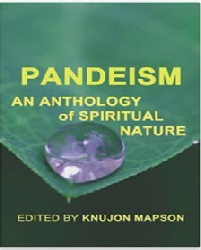The Moral Problem
“No religion has ever given a picture of deity which men could have imitated without the grossest immorality."
~ George Santayana, Little Essays, No. 24, "Pathetic Notions of God"
The Christian God delivered Robert Green Ingersoll to agnosticism: “This God withheld the rain, caused the famine, saw the fierce eyes of hunger ~ the wasted forms, the white lips, saw mothers eating babes, and remained ferocious as famine.” (Why I Am Agnostic) What moral example does the Pandeist God provide? The Pandeist God both created and includes in its being natural evil. Natural evil is my nemesis. I so wanted to believe in a good God despite natural evil that I developed the following theodicy:
“The theodicy that evil and suffering were necessary for spiritual growth gave me considerable pause. Yes, it was true that valuable lessons in compassion, self-sacrifice, and interdependency were born of suffering. Socially, natural disasters invited disparate groups to come together to face a shared challenge. Individually, overcoming obstacles built character and strengthened us for further challenges ahead. If all suffering were karmic or just, then we would be far less likely to grow spiritually from it because, instead of feeling compassion, we may just feel smug knowing the suffering person deserved it. Unjust suffering taught us important lessons that just suffering might not. I had learned important lessons from suffering but only because I had survived my suffering and was capable of learning. There was the rub. The people who died during a natural disaster did not benefit by learning valuable lessons in compassion, self-sacrifice, and interdependency. Babies who suffered did not benefit by learning valuable lessons in compassion, self-sacrifice, and interdependency. Severely and profoundly developmentally disabled people did not benefit by learning valuable lessons in compassion, self-sacrifice, and interdependency. Actively psychotic people did not benefit by learning valuable lessons in compassion, self-sacrifice, and interdependency. The animals that suffered or died did not benefit by learning valuable lessons in compassion, self-sacrifice, and interdependency. I sat with this for some time. I could not figure out how God could care for each one of us individually and still allow the suffering of babies and mentally challenged people and animals who could not benefit from their suffering. I could not understand how someone who died in a natural disaster grew spiritually from the experience. In my commitment to face a fact though it slay me, I came to a conclusion that troubled me very much at first: I decided that God did not care about us individually.
After the initial shock wore off, this idea began to trouble me less. I had grown uncomfortable with individual salvation because it seemed like a lot of supposedly religious people were more concerned in reaping rewards and seeing ‘other’ people suffer than pursuing, loving, and living out God. I felt like heaven and hell were impediments to people's purely loving God for the sake of loving God. As long as you were concerned for your personal salvation, you were not really focused on God. I had been intrigued by the Eastern Orthodox concept of deification and the Hindu goal of Brahman and Atman uniting once the Veil of Maya had been lifted.
The point of convergence was the goal, not a personal salvation. The death of a baby in a flood did not help that baby grow spiritually but it did invite others to grow and at the point of convergence that baby was one with all of us and with God. We were all in this together. Convergence celebrated our interconnectedness and properly valued our personal salvation in the context of our loving relationship with others. If we had not moved beyond our self-concern, we had not yet moved to God and we were not yet saved. When we reached out in love to others as agents of God’s love, we converged with God and that was our salvation. Convergence. I was so happy to have found it because had I not the problem of natural evil would have bested my belief in a good God.
My belief was not quite bested; however, I will admit to you that the problem of natural evil remains the weakest link in my faith in God. If I was unwilling to build my foundation on a religion that suggested bad things about God, how could I build a foundation on a God that established a natural order that led to evil? Well, I could interpret natural evil as necessary for inviting convergent spiritual growth since the impersonal and undeserved quality of natural evil invited the love of neighbor in a way that a deserved evil would not. Okay, but how did inviting convergent spiritual growth through the atrocity of natural evil differ from God’s somehow inviting spiritual growth through the atrocities ascribed to God in the Bible and other holy books? The best response I could come up with is this one: Natural evil invites the movement of love in the world. When we hear about the victims of disease, we donate money to help find a cure. When we hear about the victims of natural disasters, we send money and supplies and travel to the site to help in any way we can. On the other hand, when we hear of God's supposedly threatening parents with the death and cannibalization of their children or ordering the genocide of an entire people including babies and livestock or killing sons for burning the wrong incense, we just think badly of God. We come to fear God rather than love God. When we hear that God condemns those who have not believed in the name of His ‘one and only Son’ even though many, many people were at a severe disadvantage to ever hear his Son's name, then we think God is unfair or we decide that we, too, have license not to love these ‘other’ people. The atrocities ascribed to God in the Bible and other holy books do not invite the movement of love in the world; so, I could logically defend my building a foundation on a God that established a natural order that led to evil while refusing to build my foundation on a religion that ascribed atrocities to God.” (GOD-centric, Ch. 5)


